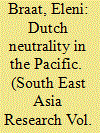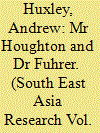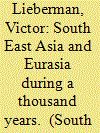| Srl | Item |
| 1 |
ID:
103508


|
|
|
|
|
| Publication |
2011.
|
| Summary/Abstract |
The international disarmament debate of the 1920s provided an important opportunity for the Netherlands to raise the international profile of its colonial interests. This paper examines how Dutch participants in the disarmament debate combined the long-lived Dutch principle of neutrality with the different geopolitical situation of the Dutch East Indies. It shows that (1) Dutch delegates did not strictly interpret and apply the principle of neutrality to their colony in the Pacific. This seems contrary to (2) the Dutch perception that the position in Europe was almost identical to the situation in the Pacific. The little attention paid to these different interests in the Netherlands and the Dutch East Indies arguably developed from (3) a surprising naivety and provincialism concerning the geopolitical position of the Dutch East Indies. These three related conclusions illustrate the unfortunate composition of the delegations to the disarmament negotiations and the ignorance with which the Foreign Ministry intervened in colonial issues, arguably also indicating that Dutch colonial external relations and defence policy were ill-defined and not effectively adapted to the Pacific context.
|
|
|
|
|
|
|
|
|
|
|
|
|
|
|
|
| 2 |
ID:
103507


|
|
|
|
|
| Publication |
2011.
|
| Summary/Abstract |
This article shows mainly how the administrators and workers in the Thang Long cigarette factory in Hanoi coped with a deepening food shortage from the 1970s to the mid-1980s. When the government could not provide a stable supply of food or prevent rising food prices on the open market, the factory administrators organized food-related programmes for their workers, such as eating halls, rest homes and schools for workers' young children. But these programmes could not meet the workers' needs during the crisis years, so they relied on themselves. They pursued a variety of activities, including increasing their working hours, seeking other jobs outside and pursuing illicit activities to earn extra money. The evidence in this article further indicates that the Vietnamese government modified its policies as it tolerated deviations from its socialist vision of a centralized economy.
|
|
|
|
|
|
|
|
|
|
|
|
|
|
|
|
| 3 |
ID:
103506


|
|
|
|
|
| Publication |
2011.
|
| Summary/Abstract |
Between 1895 and 1921, the early history of Burma rested on a false premise: that the three oldest inscriptions found in Burma were genuine. Who forged these inscriptions? Why did they do so? By whom were the forgeries exposed? The answers to these questions prompt troubling thoughts about how state power impinged on the autonomous pursuit of knowledge during the high noon of the British Empire.
|
|
|
|
|
|
|
|
|
|
|
|
|
|
|
|
| 4 |
ID:
103504


|
|
|
|
|
| Publication |
2011.
|
| Summary/Abstract |
During roughly a thousand years, from c 800 to 1830, in each of mainland South East Asia's three principal corridors, once self-sufficient political and cultural isolates became integrated into larger, more stable systems. In basic form, chronology and dynamics, this long-term process resembled that in other parts of Eurasia's 'protected rimlands', including Europe and Japan. But despite certain pan-Eurasian features, long-term integration in the rimlands remained distinct from that in India and China, both part of the 'exposed zone' of Eurasia.
|
|
|
|
|
|
|
|
|
|
|
|
|
|
|
|
| 5 |
ID:
103505


|
|
|
|
|
| Publication |
2011.
|
| Summary/Abstract |
The authors analyse the 2010 mayoral election in the city of Medan, North Sumatra. Medan is an ethnically and religiously diverse city and the authors treat the elections here as a case study of inter-communal dynamics in local elections in plural regions of Indonesia. The first round of the vote was contested by 10 pairs of candidates and occurred in a climate of cross-ethnic alliance building and appeals that, the authors argue, are typical of broader Indonesian patterns. The second round confronted voters with a choice between a Muslim candidate and an ethnic Chinese candidate who was also a Buddhist. There was a sudden switch in the tone and themes of the contest. A concerted campaign was launched to convince Muslim voters to support the Muslim candidate, with politicians and religious leaders alike suggesting that it was a religious obligation to do so. The campaign proved effective and the Muslim candidate, a member of the province's established political elite, won by a large margin. The article focuses on the campaign teams' strategies, analysing their electoral calculations and the techniques used to appeal to a multi-ethnic constituency. It also considers the role played in the poll by Medan's rich array of ethnic associations. The authors conclude by pointing to lessons of the Medan case for wider patterns of ethnic coalition building in Indonesia. They also describe this election as an example of the 'identity switching' that can take place when political actors choose from multiple and overlapping identity categories in changing political contexts.
|
|
|
|
|
|
|
|
|
|
|
|
|
|
|
|